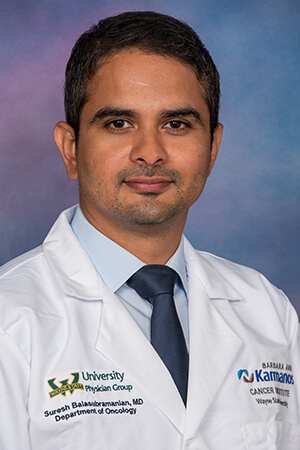
- Acute Myeloid Leukemia (AML)
- Aplastic Anemia
- Myelodysplastic Syndromes (MDS)
- Myeloproliferative Neoplasms (MPN)
- Paroxysmal Nocturnal Hemoglobinuria (PNH)
- Pure Red Cell Aplasia (PRCA)
Dr. Balasubramanian completed his medical training at Madras Medical College in India. His interest in treating malignant hematology patients started in his advanced training in Singapore in the Department of Hematology and Bone Marrow Transplant. He was intrigued by the advancement of cancer genetics and its application in the development of novel therapeutics.
He strongly believes in the concept of being a physician-scientist. He completed a year of clinical research fellowship in Neuro-Oncology at Cleveland Clinic, where he investigated the role of EGFR mutations and ALK rearrangement in lung cancer brain metastases. While he enjoyed publishing research in Neuro-Oncology, he realized his inner calling was for malignant hematology and leukemia research. He also did a translational hematology research fellowship in bone marrow failures and myeloid neoplasms at Dr. Maciejewski's lab in Cleveland Clinic. Dr. Balasubramanian was part of CCF’s MDS/AML research group's collaborative effort to perform and analyze comprehensive next-generation sequencing on a large cohort of myeloid neoplasm patients. Soon after that, he completed a hematology/oncology fellowship training at Wayne State University. After his fellowship, Dr. Balasubramanian is currently employed as a Clinical Scholar with a research and patient focus in malignant hematology.
Dr. Balasubramanian is currently working in collaboration with basic scientists at Wayne State University as part of the translational hematology program. With quite a few unanswered problems in the field of clonal hematopoiesis/MDS/leukemia research, his ultimate goal is to grow as a physician-scientist applying the novel results of sequencing studies to help elucidate disease biology, functionalize those findings in the lab and ultimately translate them to advance patient care.
- accepting new patients
